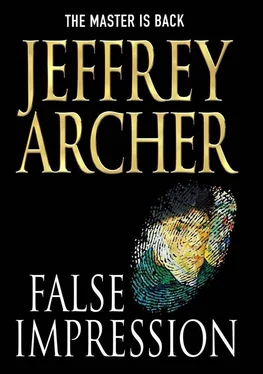Like all gymnasts, Krantz wanted to be number one in her discipline. Having perfected all the routines in the compulsory section — broken arms, broken legs, broken necks — she moved on to her voluntary exercise, “cut throats,” a routine at which no one could challenge her for the gold medal. Hours of dedicated practice had resulted in perfection. While others attended a football match or went to the movies on a Saturday afternoon, Krantz spent her time at a slaughterhouse on the outskirts of Bucharest. She filled her weekend cutting the throats of lambs and calves. Her Olympic record was forty-two in an hour. None of the slaughtermen reached the final.
Ceauşescu had paid her well. Fenston paid her better. Krantz’s terms of employment were simple. She must be available night and day and work for no one else. In a space of twelve years, her fee had risen from $250,000 to $1 million. Not for her the hand-to-mouth existence of most illegal immigrants.
Fenston extracted a folder from his briefcase and handed it across to Krantz without comment. She turned the cover and studied five recent photographs of Anna Petrescu.
“Where is she at the moment?” asked Krantz, still unable to disguise her mid-European accent.
“London,” replied Fenston, before he passed her a second file.
Once again she opened it and this time extracted a single color photograph. “Who’s he?” she inquired.
“He’s more important than the girl,” replied Fenston.
“How can that be possible?” Krantz asked, as she studied the photo more carefully.
“Because he’s irreplaceable,” Fenston explained, “unlike Petrescu. But whatever you do, don’t kill the girl until she’s led you to the painting.”
“And if she doesn’t?”
“She will,” said Fenston.
“And my payment for kidnapping a man who has already lost an ear?” inquired Krantz.
“One million dollars. Half in advance, the other half on the day you deliver him to me, unharmed.”
“And the girl?”
“The same tariff, but only after I have attended her funeral for the second time.” Fenston tapped the screen in front of him and the driver pulled up to the curb. “By the way,” said Fenston, “I’ve already instructed Leapman to deposit the cash in the usual place.”
Krantz nodded, opened the door, stepped out of the car, and disappeared into the crowd.
“Good-bye, Sam,” said Jack, as his cell phone began to play the first few bars of “Danny Boy.” He let it go on ringing until he was back out on East Fifty-fourth Street because he didn’t want Sam to overhear the conversation. He pressed the green button as he continued walking toward Fifth Avenue. “What have you got for me, Joe?”
“Petrescu landed at Gatwick,” said Joe. “She rented a car and drove straight to Wentworth Hall.”
“How long was she there?”
“Thirty minutes, no more. When she came out, she dropped into a local pub to make a phone call before traveling on to Heathrow, where she met up with Ruth Parish at the offices of Art Locations.” Jack didn’t interrupt. “Around four, a Sotheby’s van turns up, picks up a red box—”
“Size?”
“About three foot by two.”
“No prizes for guessing what’s inside,” said Jack. “So where did the van go?”
“They delivered the painting to their West End office.”
“And Petrescu?”
“She goes along for the ride. When the van turned up in Bond Street, two porters unloaded the picture and she followed them in.”
“How long before she came back out?”
“Twenty minutes, and this time she was on her own, except she was carrying the red box. She hailed a taxi, put the painting in the back, and disappeared.”
“Disappeared?” said Jack, his voice rising. “What do you mean, disappeared?”
“We don’t have too many spare agents at the moment,” said Joe. “Most of our guys are working round the clock trying to identify terrorist groups that might have been involved in Tuesday’s attacks.
“Understood,” said Jack, calming down.
“But we picked her up again a few hours later.”
“Where?” asked Jack.
“Gatwick airport. Mind you,” said Joe, “an attractive blonde carrying a red box does have a tendency to stand out in a crowd.”
“Agent Roberts would have missed her,” said Jack, as he hailed a cab.
“Agent Roberts?” queried Joe.
“Another time,” said Jack, climbing into the back of a cab. “So where was she heading this time?”
“Bucharest.”
“Why would she want to take a priceless Van Gogh to Bucharest?” asked Jack.
“On Fenston’s instructions, would be my bet,” said Joe. “After all, it’s his hometown as well as hers, and I can’t think of a better place to hide the picture.”
“Then why send Leapman to London if it wasn’t to pick up the painting?”
“A smokescreen?” said Joe. “That would also explain why Fenston attended her funeral when he knows only too well that she’s alive and still working for him.”
“There is an alternative we have to consider,” said Jack.
“What’s that, boss?”
“That she’s no longer working for him, and she’s stolen the Van Gogh.”
“Why would she risk that,” asked Joe, “when he wouldn’t hesitate to come after her?”
“I don’t know, but there’s only one way I’m going to find out.” Jack touched the red button on his phone, and gave the taxi driver an address on the West Side.
Fenston switched off the recorder and frowned. Both of them had listened to the tape for a third time.
“When are you going to fire the bitch?” was all Leapman asked.
“Not while she’s the one person who can still lead us to the painting, Fenston replied.
Leapman scowled. “And did you pick up the only word in their conversation that matters?” he asked. Fenston raised an eyebrow. “Going,” said Leapman. Fenston still didn’t speak. “If she’d used the word coming . ‘I’m coming home’ — it would have been New York.”
“But she used the word going,” said Fenston, “so it has to be Bucharest.”
Jack sat back in the cab seat and tried to work out what Petrescu’s next move might be. He still couldn’t make up his mind if she was a professional criminal or a complete amateur. And where did Tina Forster fit into the equation? Was it possible that Fenston, Leapman, Petrescu, and Forster were all working together? If that was the case, why did Leapman only spend a few hours in London before returning to New York? Because he certainly didn’t meet up with Petrescu or take the painting back to New York.
But if Petrescu had branched out on her own, surely she realized that it would only be a matter of time before Fenston caught up with her. Although, Jack had to admit, Petrescu was now on her own ground and didn’t seem to have any idea how much danger she was in.
But Jack remained puzzled as to why Petrescu would steal a painting worth millions when she couldn’t hope to dispose of such a well-known work without one of her former colleagues finding out. The art world was so small and the number of people who could afford that sort of money even smaller. And even if she succeeded, what could she hope to do with the money? The FBI would trace such a large amount within hours, wherever she tried to hide it, especially after Tuesday’s events. It just didn’t add up.
But if she did take her audacious act to its obvious conclusion, Fenston was in for a nasty surprise, and no doubt would react in character.
As the taxi swung into Central Park, Jack tried to make some sense of all that had happened during the past few days. He had even wondered if he would be taken off the Fenston case after 9/11, but Macy insisted that not all his agents should be following up terrorist leads while other criminals got away with murder.
Читать дальше












